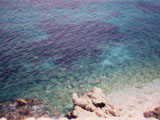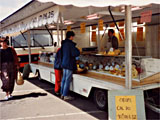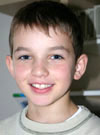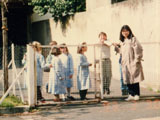|
|
| |
■
『世界の英語教室 (小学校)』[フランス編]
By Mina Hisada/Illustration by Puri
 New!
New!
| Hello from France! (フランスからこんにちは!)
|
 僕たちの国は、おいしいもので有名で、きれいな言葉を話しているとよく言われます。
パパやママが子供のころは「英語が通じない国」として知られていたそうです。
今は、小学校でも英語が教えられています。ヨーロッパにある、僕たちの国は一体どこでしょう?
僕たちの国は、おいしいもので有名で、きれいな言葉を話しているとよく言われます。
パパやママが子供のころは「英語が通じない国」として知られていたそうです。
今は、小学校でも英語が教えられています。ヨーロッパにある、僕たちの国は一体どこでしょう?
(My country is famous for its delicious cuisine. People often say that we speak a beautiful language.
When my mum and dad were kids, my country used to be well-known as a place where people did not understand English.
But nowadays, English is taught even at elementary school. Can you guess which country this is?
Hint: it's in Europe. )
|
|
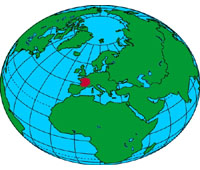
|
第3回目の今回は、
フランスの小学生にスポットライトを当てます。 |
|
 |
| (今回登場してくれるお友だち) |
答えはフランスです。
フランスといえば、かつて『最も英語が通じない国』や『国民が最も英語を話したがらない国』
として有名でした。ところが、今では英語教育を小学校からはじめ、さらに第二外国語を
中学校で習わせるなど、言語教育に力を注いでいます。
今回は、二人の小学生を通して、その実態を見てみましょう。
 |
| (日本からのお土産を手に) |
(The answer is a 'France.' The French were once a famous for their inability to speak in English.
Now, France is trying to emphasize the importance of foreign laguages such as English.
These days English is taught from the age of 7-8. Let's meet two elementary school students to see what English
education is really like in France.)
|
■PART 1
フランスのマックス君(11歳)とタンギ君(9歳)
(Today's friends are Maxance -11 years old- and his brother, Tanguy-9 years old.)
 を押すとマックス君とタンギ君の声が聞こえます。
を押すとマックス君とタンギ君の声が聞こえます。
|
|
| TIME |
WHAT I DO |
|
8:00-9:00 |
英語(English)
|
|
9:00-10:00 |
算数 (Math)
|
|
10:00-11:00 |
美術(Art)
|
|
11:00-12:00 |
算数 (Math)
|
|
12:00-14:30 |
お昼休み
|
|
14:30-15:30 |
フランス語
|
|
15:30-16:30 |
算数 (Math)
|
※注釈
(Note) |
★フランス語と
算数は毎日勉強する。
(French and Math are taught every day.)
★日本の小学校では一時限45分の授業だが、フランスでは60分となっている。
授業の合間の休み時間は、低学年の場合20分間で、高学年になると10分間になる。
(Classes are 45 minutes long in Japan, and 60 minutes long in France.
There are 10-minutes breaks between each classes at the higher level, and 20 minutes
at the lower level.)
見て!これが時間割です。
(↓クリックすると大きくなります。)
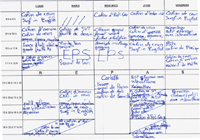
★お昼休みが1時間45分(学校によっては2時間)もあるので、
お昼を家に帰って食べる生徒もいれば、学校の食堂で食べる生徒もいる。
(Lunchtime is quite long - 1 hour and 45 minutes.In some schools it is almost 2 hours.
Some students eat lunch at home, and others eat lunch at the school cantine.)
|
|
■PART 3-- その1
フランスの子供はどうやって英語を勉強するの?
(How do French Kids master English?)
●
教科書の特徴 (Characteristics )
☆★アクセントに重点☆★
赤い文字のところは強く発音すること!と注意書きがある。
(The book says you should try and pronounce the text in red.)
|
☆★イラストが可愛く、カラフルな色使い☆★
かわいいネズミの絵を使って、現在・過去形の練習をする。
(They practice how to use present tense and past tense, using a pretty illustration of a mouse.)
|
■PART3 — その2
フランス英語の特徴(Characteristics of French English)
フランス人が話す英語は、どのような特徴があるのでしょうか。
(What are the characteristics of French English?)

(筆者の友人マルガン君が筆者に宛てた誕生日カード。"old" となるべきところが、"hold" となっている。)
| |
●
特徴1(Characteristic 1)
★H(アッシュ)がクセモノ★
フランス語では、H(エイチ)はH(アッシュ)と発音されます。
なので、フランス人の英語には以下のような傾向が見られます。
(In French, "H" is pronounced "Ash.")
☆Hの発音をしない傾向がある☆
(They tend not to pronounce "H")
Example (例)
Question: Where are you going?
Answer: I am going to "eathrow".
「「ヒースロー」というべきところ)」
(Correct pronunciation:'Heathlow')
☆Hを入れないところで入れてしまう傾向がある☆
(They tend to put 'h' on words that don't need them.)
Example (例)
Happy Birthday to you!
You are hold.
("old"と言うべきところ)
(Correct pronounciation: 'old')
|
|
■PART 4
フランスの小学校についての基本データ
( General information on public elementary schools in France)
★クラスの人数
(How many students are there in a class?) |
25-30人
(About 25-30.) |
★英語は何歳からはじめるの?
(When do you start learning English?) |
学校によるが、大抵7-8歳から 。
(It depends on the school. In general, from 7-8 years old.)
|
★政府は小学校での英語教育を奨励している?
(Is English education encouraged from an early age?) |
している。
Yes & No(はい&いいえ)
※これに関しては、人により意見が二つに分かれました。
(The answers for this question divided into two types.)
Yes派
⇒ここ数年特に感じる
(I think so. Especially in the last few years.)
⇒さまざまな言語を抱えるEUでは、その中でも比較的易しい英語がコミュニケーションの際、重要な言葉として役割を果たしているから。
(English is one of the easiest languages in Europe and it's used most frequently to communicate with people.)
⇒英語が世界の共通語であることを認識しているから。
(Because the government recognizes it as a global language.)
No派
⇒特にそのようなことは、ない。
(Not especially.)
⇒しているとは、思わない。
(I don't think so.)
|
★それで、小学校での英語の授業は週何時間あるの?
(On average, how many hours each week do elementary school students study English?)
|
1−2時間
(1-2 hours) |
★
フランスでは、みんな英語教育に興味はあるの?
(Are most people interested in English education in France?) |
Yes & No(はい&いいえ)
※先の質問と同じく、人により答えが二つに分かれました。
(Same as the above question. The answers can be divided into two different type.)
|
★英語の塾はあるの?
(Are there many English cram schools in Japan?) |
ある。
(Yes there are.)
|
★英語の先生はネイティブ?
(Are the English teachers native speakers?) |
いいえ。先生は基本的にフランス人。
(Basically, French.)
小・中学校ではまれだが、高校になるとイギリス人の先生が教えていることがある。
(It's very rare in elementary and junior college, but there are some in high school.
Most of them are from the U.K.)
|
★外国人の生徒や移民はいるの?
(Are there foreign students? If so, where are they from?) |
移民は多い。特に、北アフリカから。中でも、特にかつて植民地だったアルジェリア、そしてモロッコからが多い。最近では東ヨーロッパからも増えている。
(There are many immigrants — Especially from North Africa,which was once colonized by France, e.g., Algeria and Morocco. Recently, the numbers from Eastern Europe is increasing.)
|
★日本の小学校でも英語が必須科目になるかもしれないの。どう思う?!
('English' might be a compulsory subject at elementary schools in Japan. What do you think about this?) |
※これに関しても、答えが二つに分かれました。
(The answers for this question can be divided into two types.)
Yes派
⇒反対する理由が見つからない。
(I have no reason to say "No".)
No派
⇒「先生の質」次第でしょう。
(It depends on the quality of teachers.)
|
|
|
■PART 5
人々の声
Vox populi
 を押すと、それぞれの声が聞こえます。
を押すと、それぞれの声が聞こえます。
 フランス人が見た小学生の英語教育
フランス人が見た小学生の英語教育
★
このサイトに登場してくれたお友達のお母さんから見た英語教育
(Maxance and Tanguy's mum is a secretary. Let's hear her opinion.)
|

|
1.<フランス人の英語への関心について>
(Concerning of English of French people)

もちろん人にもよりますが、概してあまりないと思います。英語のみならず、ほかの言語に対しても正直言って、あまり関心がない人が多いと思います。ただ、英語のできる人を企業がどんどん採用するようになってきたことに伴い、人々の関心も以前に比べて高まってきた気がします。
(Of course it depends on the person, but generally, we are not that interested in English.
Not only English, we are not that interested in other foreign languages. However, it's been changing over time
as many companies prefer pepole who can use English.)
2.<フランスでの小学生英語教育について>
(About English education in France)

フランスの小学校で英語を教えているといっても、週1-2時間。英語を学ぶというより、触れるといった感じです。
クラスでは、あいさつや色の言い方、曜日の言い方、数の数え方などを練習しています。
(In France, English is taught at elementary school but only for 1-2 hours per week.
Students just learn the basics such as greetings, color, how to say Monday, Tuesday,Wednesday,etc.,and how to count.)
彼らは英語を「学ぶ」というより、「楽しんで」いるようです。
(It's less like they're "studying" English than "enjoying" English.)
本格的に英語を「学ぶ」のは11歳になってからで、週に4-5時間を英語に費やすようになります。
(When they turn 11, they start studying seriously.They spend 4-5 hours on English per week.)
|
|
 日本通のフランス人から見た小学生の英語教育
日本通のフランス人から見た小学生の英語教育
★Jeremieさんは日本に留学経験があって、翻訳家を志望する青年。彼が語る日本の英語教育とは?
(Jeremie once studied in Japan and he wants to be a translator.
What does he think of English education in Japan? Let's hear his opinion.)
|
 |
<早期英語教育について>
(About Early English education)
日本の小学校で英語を教えることが、そんなに必要なことでしょうか。私にはそう思えません。もっとほかに教えるべきことがあると思います。もし、今の風潮に流されて早期英語教育を実施したら、日本語がきちんと話せない子供が増える一方だと思います。それに、特に小学校で英語を習っていなくても、それ以降にきちんと英語を勉強した日本人は、立派な英語を話していますよ。「英語」に関して、日本の社会全体が神経過敏になっていると思います。
(Is it so necessary to teach English in Japanese elementary schools? I do'nt think so. There are probably
more important things to teach children at that age. If you place too much importance on learning English,
you may even run the risk eventually of a growing number of children who can't use proper Japanese.
There are many Japanese people who never studied English in elementary school but studied it later
and who do speak good English. In my opinion, Japanese people and Japanese society are worrying too much about "English".)
<フランスと日本の英語教育について>
(About English education in France and Japan)
実は、フランスも日本と同じ問題を抱えていると思います。まずは教師の「質」。教える側に英語力がないため、授業ではなかなか英語を使って教えることができないのです。「書く」ことに重点が置かれ、「話す」チャンスがなかなかない。今後教師のレベルが上がらなければ、いくら8歳から英語を教わったとしても意味がないと思います。
私の経験上、語学をマスターするのに一番いい方法はテレビだと思います。毎日字幕なしで、その言語のテレビを見続ける-そして実際に使ってみる-私はこれで英語と日本語をマスターしました。
(Actually, I think France and Japan have the same problem. One of them is quality of teachers. Many cannot teach English in English because their English is not good enough.
There is too much emphasise on 'writing' and not enough on speaking. Unless the quality of teaching increases,
there is no point in teaching English to eight-year-olds.I think the most efficient way of mastering a foreign
language is by watching TV. I mastered both English and Japanese that way.)
|
|
 フランスのJポップファンから見た日本人の英語
フランスのJポップファンから見た日本人の英語
★日本のアニメやJポップが好きなMichaelさんは、現在イラストレーターとして活躍中。

( Michael is a big fan of Japanese Anime. He currently works as a illustrator.) |

|
日本でどんな授業が行なわれているか知らないけれど、英語を話せる人が少ないと思う。
特に気になるのは発音。Girls は Galsに聞こえる。僕はJ-POPが大好きでよく聴くんだけど、話せないわりに英語の歌詞がいつも入ってるみたい。でも、歌う人たちはその意味がよく分かっていないのでは?
(I don't know how English is taught in Japan, but I think there don't seem to be that many English-speakers
in Japan.Take, for example, their pronunciation. "Girl" sounds like "Gal".
I really like J-Pop and often listen to it. A lot of the lyrics are in English, even though many of the singers
don't actually speak English. Do they understand what they are singing? I doubt it.)
|
|
 フランスにいたことのあるママの現地情報とは?
フランスにいたことのあるママの現地情報とは?
★嘉子さんには、小学校2年生の女の子がいます。フランスに家族と4年間滞在していました。
そんな彼女が語る、フランスのママたちがやっている英語教育とは??
(Yoshiko's daughter is 8 years old. She has lived in France for 4 years with her family.
How do French mums go about helping their kids learn English?)
|
| |
フランスに滞在していたころ、オーペア制度を利用して、イギリス人の女の子に子供の英語力アップをお願いしている「先取り」ママがいました。「オーペア制度」とは、海外からフランス語を習いに来た若い女の子に部屋を無料で貸す代わりに、掃除洗濯をお願いしたり、その子の母国語を自分の子供に教えてもらう制度です。すぐ隣が英語圏であるという利点を利用して、フランスではこんなふうにして、子供が英語と触れ合ったりしているんです。
(When I was in France, I met some mums who made use of the 'au-pair'system to let their children learn English. Through this system, young girls from abroad stay at their house free of charge and do housework and teach their kids English.)
|
|
 世界を飛び回るエンジニアから見た英語教育
世界を飛び回るエンジニアから見た英語教育
★スウェーデンへの留学経験があるMarcさんは、ドイツ人の奥さんを持つエンジニア。そんな国際色豊かな彼から見た、早期英語教育・フランスの英語事情とは?
(Marc is an engineer whose wife is a German. He has lived for a while in Sweden.
With such an international background, what does Marc think about early English education?)
|

|
<早期英語教育・フランスの英語事情について>
(About early English education
and the situation in France)
本当にやらせたかったら、少なくとも週10−15時間、「いい先生」について学ばせる必要があると思います。週2-3時間では英語をものにできるまではいかないと思います。一度学校の外に出ると、子供たちは英語をしゃべる必要も聞くこともないわけだから。例えばフランスでは、英語圏の映画やドラマは、声優がフランス語で吹き替えてしまうことがほとんどです。そのためせっかく習った英語もドラマを通して聞く機会がありません。私が留学していたスウェーデンでは、常にスウェーデン語の字幕が付き、「生の」英語を聞くことができました。多分彼らの英語力が高いのも、こんな違いが関係しているのでしょう。
(If you really want kids to study English, they must study at least 10-15 hours with a good teacher.
I think 2-3 hours per week is not enough to master the language - because they don't have the chance to speak English
or listen to English outside of school. In France, movies and TV programs in English are usually dubbed into French. This means we can not practice our English listening skills. In Sweden where I lived before, movies and TV programs are
subtitled in Swedish and so they always have the opportunity to listen to English spoken by English native speakers.
Perhaps their high English ability has something to do with this.)
<言語教育とフランスについて>
(About English education in France and Japan)
英語教育については、教師のレベルの質があまりよくないことが挙げられると思います。
また、確かに英語は世界の共通語ですが、フランスの近隣諸国の言葉―ドイツ語やスペイン語―をないがしろにしてはいけないと思います。それは、地方に残る言葉―ブルターニュ地方のブルトン語、バスク地方のバスク語―なども同じこと。事実、地方によっては、こういった言語を小学校で教えたりしています。一般的にいって、フランス人は、外国語を話したり学んだりするということにあまり興味がない国民だと思います。現にエンジニアのように英語を使って仕事をする世界でも、英語が話せない人がたくさんいます。
(I think the bad quality of teaching is one of the bad points I have to mention.
It's true that 'English is a global language, but that does not mean we should forget about other languages.
such as the languages of our neighbors, like Germany or Spain, or regional languages - Breton and Basque.
These languages are taught in elementary school depending on the area. Generally speaking,
the French are not that interested in speaking or learning foreign languages. In fact, there are a lot of French
engineers who can not speak English.)
|
|
■PART 6
フランスの教育制度
The French education system

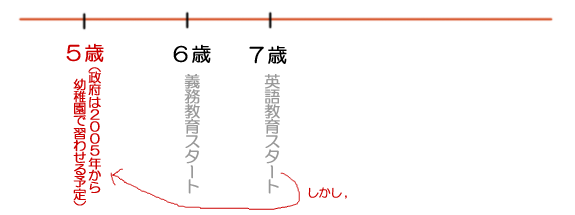
★フランスでは、義務教育は6歳から16歳までとなっています。
(At the age of 6, every French person goes to elementary school.
It's required by law that all children go to school between the age of 6 and 16.)
★この義務教育のシステムは、1881年に定められました。
This education system was established in 1881.
★英語は、日本でいう小学校2年生(7歳)から習い始めます。
Students are required to study English at the age of 7.
☆★ここでちょこっとフランスの一面を見てみましょう。
☆★
(Now, let's have a look at France itself.)
バゲッドについて♪
(About the baguette)
バゲッド(日本では「フランスパン」)は、日本のお米と一緒。毎日の食卓に欠せないものです。
('Baguette" ? "Furance-pan" in Japanese- is just like rice in Japan.
It's necessary part of all meals.)
|
|

|
|
ワインについて♪
(About 'Wine")
水代わりのようにワインを飲むフランス人。
子供のころからたしなんでいる人も珍しくありません!?
(French drink wine like water. It's not unusual that they drink wine from an early age!?)
|
|

|
ウサギ狩り♪
(Go gunning for rabbits)
ちょっと郊外に行くと、狩りをしている人にも出会います。
(You can encounter hunters in a suburb.)
狩りのあとは狩人の小屋で乾杯!やはり、ここでもワインは欠かせません。
(After hunting, they give a toast in a small hut. Of course with 'Wine.')
|
|
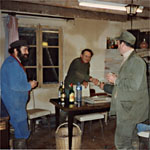
|
言葉について♪
(About the French language)
美しいフランスををいかに保つか-フランス語の使用について目を光らせる「アカデミーフランセーズ」
という公的機関があります。この機関はなんと、1635年設立。例えば、e-mailを e-mailと呼ばせず、
courrierというフランス語を使わなければならない、など厳しい規則があります。
(There is an institute called 'Academie Francaise', where all the usage of French is checked
to keep it's beauty. This institution was established in 1635. There is a strict rule.
For example, you must use 'courrier' to say 'e-mail.')
|
|

|
|
■PART 7
フランスの子どもの1年間
A typical year for a French kids

| 9月(September) |
10月(October) |
11月(November) |
12月(December) |
新学期スタート。
一学期始まる。
(Start of the new year. It's the beginning of first term.)
|
|
一学期終わる。
(End of first term.)
|
クリスマス&二学期始まる。
(Christmas! And the start of the second session.)
|
| 1月(January) |
2月(Febuary) |
3月(March) |
4月(April) |
冬休みあり。
(Winter holidays.
December 8th to January 3.)
新年のお祝いをするよ。

|
二学期終わる。10日間の休みがあるよ。
(End of the second session.
There are 10 days vacation.)
マルディグラ
(Mardi-gras ---謝肉祭)
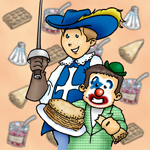
|
3学期始まる。
(Start of the third session.)
|
復活祭。
(3/16-4/2までお休み)
(Easter Holidays form March 16 to April 2.)
|
| 5月(May) |
6月(June) |
7月(July) |
8月(August) |
5/1は第二次世界大戦戦勝記念日。
軍隊のパレードがある。
(Anniversary of the Victory of the Word War II- May 1st.)
パレード風景

|
Fete de la musique
(音楽の祭り)
フランス中で、コンサートが行なわれる。
(Music Festival on June 21st.Enjoy the concert everywhere in France!)
|
7/14は建国記念日。
(July 14th is our National Day!)
花火もあがるよ!

|
Assomption
(聖母マリアの被昇天の祝日)
(Ascension of the Virgin Mary.)
|
|
|
☆★編集吐息☆★
 |
*フランスといえば、EU加盟国。EUの前身であるECSC結成を呼びかけたのは、フランスの外相、ロベール・シューマンでした。当時、国民は度重なる戦争に疲れきっていました。そんな国民を前にして、いっそうのこと、その争いの原因になるもの、つまり石炭や鉄鋼産業をヨーロッパ同士で管理しよう!と呼びかけたのがシューマンだったのです。1950年のことです。
(France is a member of the European Union. A earlier form of the EU, the EUSC, was formed by Robert Shuman, who was the minister for foreign affair in France at the time. In those days, the French were exhausted by war. The reason for this war was coal and steel industries, and Shuman suggested that the best way to end the war was let the Europeans manage them among themselves. This was in 1950.)
時を経てECSCがEC、そしてEUになり、加盟国も増えた現在、なんと公用語は20カ国の言葉が公用語になっています。ここで出てくるのが当然「言葉」の問題です。「EUの多様な言語は文化遺産である」という観点から、言語教育はとても重要視されています。例えば、2001年には"The European Year of languages 2001"が提唱されました。これは、「母国語プラスEU内の2ヵ国語以上を学ぼう」というものです。
(Over times,as the number of its members increased, the ECSC became the EC and eventually the EU.
There are 20 official languages.
Hence, language and language education is a key point.
The diversity of its languages it is cultural heritage.
For example, 2001 was made the European Year of Languages, which encouraged people
living in the EU to study two EU languages apart from their own.)
かつて「最も英語が通じない国」として有名なフランスでしたが、そんなフランスが英語をはじめとする言語教育に力を入れ始めたのもこんな理由からだったのでしょう。今日、小学校でも英語教育を取り入れ、7−8歳から英語を学ぶようになりました。政府は、2005年からは幼稚園(5歳〜)での英語教育を取り入れるよう呼びかけています。
今後の展開が楽しみです。
(France was once famous for being a place where English was not understand. Now the French are the ones emphasizing the importance of learning foreign languages, such as English. Perhaps the formation of the EU has helped this change. At present, English is taught from age 7. In 2005, the government intends to let children start studying English from when they are 5 years old.)
|
|
|
|
|
|
|
|









